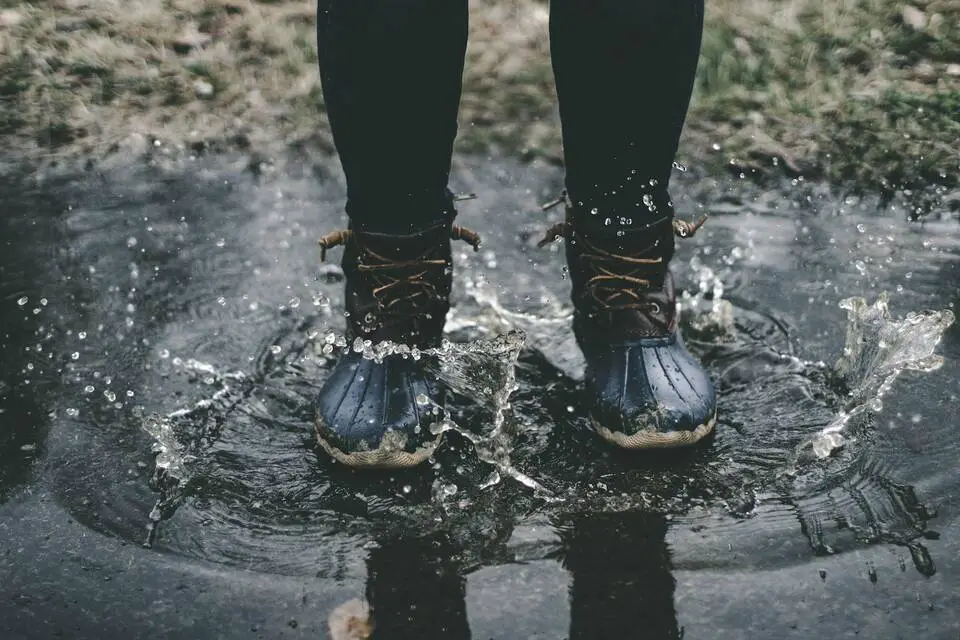Hiking in Duck Boots: Pros & Cons

What could be better than a day spent hiking in the beautiful outdoors? How about spending that day hiking in some cozy and comfy duck boots? While they provide extra insulation and protection from wet conditions, there are pros and cons to consider before you switch to duck boots for your next hike. Keep reading for more information on what to think about before packing your duck boots!
Quick Links
What Are Duck Boots?
This section is for you if you haven’t heard of duck boots before. Duck boots are a type of footwear that is typically made from rubber and leather. They are designed to keep your feet dry and warm in wet or cold conditions. Duck boots usually come up to the ankle or mid-calf, making them a great option for cold weather walks or when there is snow on the ground.
Duck boots first gained popularity in the early 1900s when they were worn by workers in New England who needed a boot that could withstand wet and cold conditions. Despite their name, the boots aren’t actually made from ducks. (You probably figured as much, though.) The boots got their name from the fact that they were often made from the same materials as duck hunting waders. Today, duck boots are still a popular choice for those who need tough and insulated boots. Like the Timberland Classic Boots, they have gained a following among fashionistas who appreciate the boots’ classic style.
Pros of Hiking in Duck Boots
Insulated & Weatherproof
There are several reasons why you might want to consider hiking in duck boots instead of your usual hiking shoes or boots. One reason is that they provide extra insulation, which can be helpful on cold days. Additionally, the boots can help keep your feet dry if you encounter any wet conditions on your hike. The rubber and leather materials of duck boots are also more durable than most hiking shoes, so you don’t have to worry as much about them getting damaged.
Stylish & Fucntional
Another pro of duck boots is that they are often stylish as well as functional. While not all duck boots are stylish, there are many brands and styles to choose from that will look great with your hiking gear. You can even find duck boots in a variety of colors, so you can really make them your own.
Of course, no boot is perfect, and there are some potential downsides to consider before you make the switch to duck boots.
Cons of Hiking in Duck Boots
Expensive
One downside of duck boots is that they can be more expensive than your average hiking shoe. Additionally, because they are made from rubber and leather, they can be heavier than other types of hiking footwear. This extra weight can be a bit much if you’re planning on doing a lot of hiking.
Chafing Issues
Additionally, because duck boots come up higher on the leg, they can rub and chafe if you’re not used to wearing them. This is especially true if you have any lower leg circulation issues. If you do decide to hike in duck boots, make sure to break them in before you hit the trails, and wear socks that will protect your skin from any potential rubbing. Maybe even consider doubling up on your socks.
Lack Of Traction
Probably the biggest issue of all, though, is that duck boots can lack traction. The leather and rubber materials of the boot can make it difficult to get a good grip on rocky surfaces – which is an absolute must for hiking.
Breathability
Another potential downside of duck boots is that they don’t provide as much ventilation as other types of hiking footwear. This can be an issue if you tend to get sweaty feet when you hike.
Finally, duck boots are designed to keep your feet dry, so they might not be the best choice if you’re hiking in very hot weather. If it’s too hot out, your feet might start to sweat, which can lead to blisters.
Ankle Support
Another potential downside of duck boots is that they don’t provide as much ankle support as some other types of hiking boots. You might want to consider a different type of footwear if you have weak ankles.
Although, some say ankle support on hiking boots is a myth. So, I would say the best way to compare is to put your hiking boots to the test against a pair of duck boots and see for yourself.
What Are Duck Boots Good For?
So, you may have already come to the conclusion that duck boots aren’t the best choice for everyone. But that doesn’t mean that they’re not good for anyone. In fact, duck boots can be a great choice for certain types of hikers.
Duck boots can be a great investment if you live in an area with cold winters and often find yourself doing some light hiking in the snow. The extra insulation will keep your feet warm, and the weatherproofing will help keep them dry.
Duck boots can also be a good choice for those who often hike in wet conditions. While they might not be the best choice for deep water, they can help keep your feet dry in light rain and mud. Duck boots can be a lifesaver if you live in a state like Florida, where rain is a regular occurrence.
While they have some potential downsides, duck boots can be used as hiking boots in certain situations. If you think they might be a good choice for you, make sure to do your research and buy a pair that fits well and provides the right amount of support.
Are Duck Boots Good For Your Feet?
So I’ve convinced you to buy a pair of duck boots – or maybe you already have a pair. But are they actually good for your feet?
I would say they are good for your feet – under specific circumstances. Duck boots can be incredibly comfortable in cold weather conditions, but they can also cause some issues if you’re not used to wearing them. Because they come up higher on the leg, they can rub and chafe if you have any circulation issues in your lower legs. Additionally, because they don’t provide as much ventilation as other types of hiking footwear, they can make your feet sweat which can lead to blisters.
If you do decide to wear duck boots, make sure to break them in before you hit the trails, and wear socks that will protect your skin from any potential rubbing. Maybe even consider doubling up on your socks. You should also be aware of the traction issues that come with duck boots and take extra care on slippery or rocky surfaces.
Are Sperry Duck Boots Good For Hiking?
Sperry is a very popular brand when it comes to duck boots. So do they make duck boots that can withstand the trials and tribulations of hiking?
I would say that Sperry duck boots are just as good as any other duck boots for hiking. They are good for light hiking in cold or wet conditions. They provide enough insulation to keep your feet warm, and the waterproofing will help keep them dry. However, you’re going to run into the same issues with Sperry duck boots as you would with any other duck boots. They’re not going to provide as much support or ventilation as traditional hiking boots, and they can be slippery on certain surfaces.
Conclusion
In conclusion, hiking with duck boots is not the WORST thing you can do. I mean, I went hiking in Crocs a few times. But as I said, it’s definitely doable. With their water-resistant and insulating properties, they can keep your feet warm and dry in a variety of conditions. However, as with any type of footwear, there are pros and cons to consider before making a purchase. So, before buying a pair of duck boots, ensure you understand the benefits and drawbacks. Are duck boots the right choice for your next hike?







